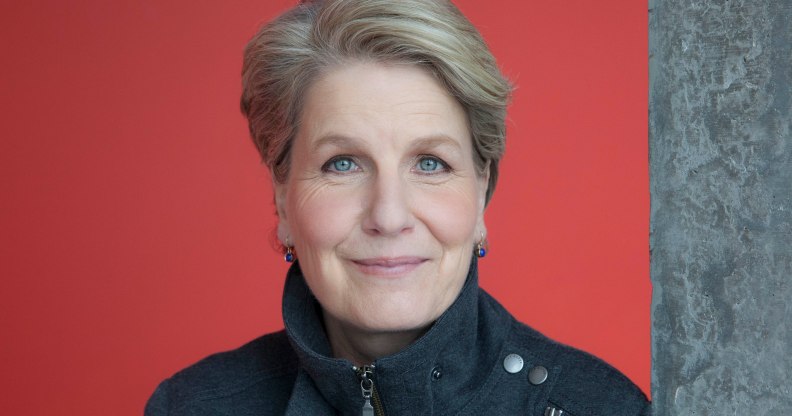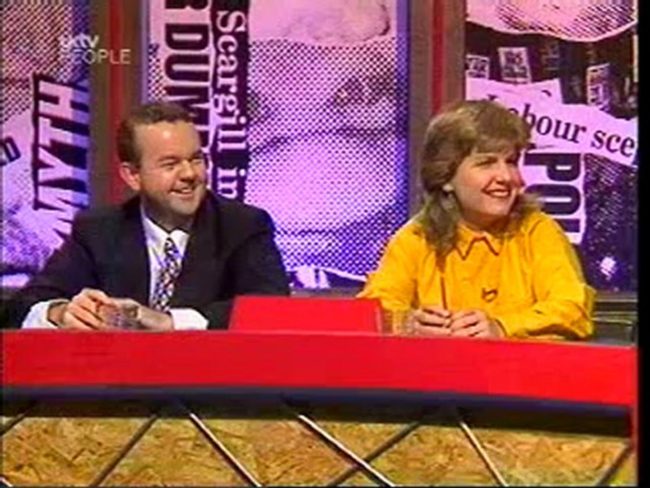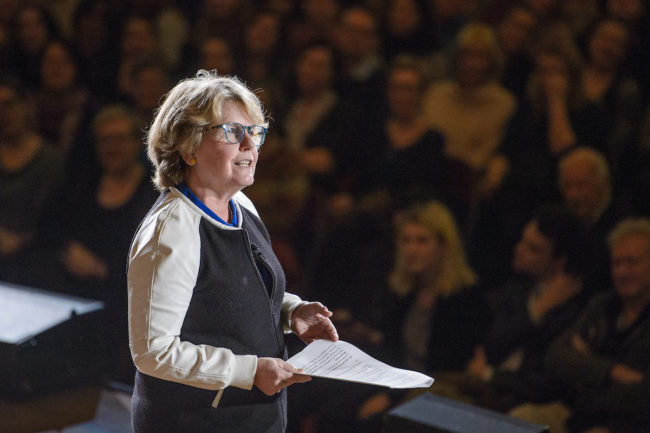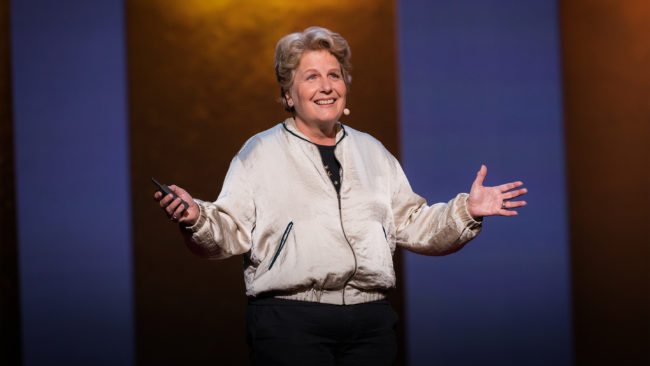Sandi Toksvig: My first crush became a nun… it was quite a rejection

Sandi Toksvig.
In 1994, the British comedian, broadcaster and presenter Sandi Toksvig became the first lesbian in the UK to come out while in the public eye. She faced a storm of criticism for doing so, and was told she would never work in TV again.
Since then, she’s defied her critics by forging an incredible career both on and off the screen. Her quick wit and wry humour have made her one of Britain’s best-loved comics, and she’s often referred to as a national treasure — although in typical Sandi style, she prefers the term ‘National Trevor.’
From starting a political party to hosting QI and The Great British Bake Off, Sandi’s done it all. She opened up to PinkNews about her love of the stage, her coming out experience, her views on LGBT-inclusive education, and her upcoming show at the Hackney Empire.
Can you remember when you first realised you were a lesbian?
I don’t think there was a particular moment of realisation. I can’t tell you, for example, it was a Tuesday at 4pm. I think it’s a bit like being right or left handed — it takes age and a bit of experience to understand what it means for how you relate to the world. But you don’t suddenly realise you’re left handed. You just are.
Who was your first crush?
My first teacher Miss MacDonald when I was four. She became a nun in a silent order which was quite a rejection.
“I heard a rumour I was going to be ‘outed’ by a tabloid and I thought ‘I can definitely out myself far better than anyone else can’, so I did it.”
— Toksvig on her decision to come out as a lesbian
You were the first woman in Britain to come out while in the public eye — why did you feel the need to take this pioneering step?
I had three children and I didn’t want them to grow up learning that their parents were a secret or something shameful. I believe secrets are a cancer of the soul so I’d already been thinking about it. Then I heard a rumour I was going to be ‘outed’ by a tabloid and I thought “I can definitely out myself far better than anyone else can”, so I did it.
The backlash following your coming out must have been incredibly daunting, particularly being told that you would never work again. Did you at any point regret your decision?
It was terrifying, honestly. We received death threats and had to take the children into hiding. But along with the death threats I started to get letters from women saying that they hadn’t dared to come out before, but then they’d seen me do it and they felt braver. Which made me feel braver too. So no, I didn’t regret it — I felt enormously proud.

Sandi Toksvig on the very first episode of TV quiz show ‘Have I Got News For You’ in 1990 (BBC)
How did your career change after coming out? What did it mean to be a gay woman on TV in the 90s?
Well one of the first things that happened was that the charity Save the Children fired me from hosting their 75th anniversary event because they wanted to protect Princess Anne from meeting a lesbian. I don’t know where they thought she had been living that she might never have met one. That was in 1994. It took until 2017 for the charity to apologise privately. Despite the dire warnings, my career seems to be pottering on which is a good thing as I don’t really have another skill set to fall back on.
What would you say to your 36-year-old self on the verge of coming out, now that you have the benefit of 25 years’ hindsight?
Go girl. You’re doing the right thing.
“I grew up always feeling like I was looking in at a world where books, films and adverts ignored the existence of people like me, and that was enormously isolating.”
— Toksvig on the importance of LGBT+ representation
You recently spoke out about the ongoing protest around LGBT+ lessons in schools. What kind of LGBT-inclusive support would you have benefited from while you were at school?
I grew up always feeling like I was looking in at a world where books, films and adverts ignored the existence of people like me, and that was enormously isolating. So I don’t think the importance of seeing your life represented can be underestimated. Feeling recognised, feeling part of a community, knowing you’re not alone, is so important.
In 2015 you co-founded the Women’s Equality Party to campaign for gender equality. What is your party doing to promote LGBT+ rights, and are your objectives inclusive of trans women too?
WE campaign for LGBT+ education in schools, for zero tolerance on discrimination and for better representation in the media. Equality is at the very heart of the party’s identity and by definition that means we are inclusive. At the very front of our first Policy Document it says that WE “support the right of all to define their sex or gender or to reject gendered divisions as they choose.”

Sandi Toksvig speaking at a Women’s Equality Party event
You’re fundraising for the Women’s Equality Party with a comedy night at the Hackney Empire on June 27. What does the audience have to look forward to?
Ideally a fair amount of laughter. Definitely some fairly unbelievable stories (which are nonetheless true). Possibly a few cartwheels but that depends on the quality of the beer. You’ll have to come along if you want to find out more.
What do you enjoy most about being on stage?
That moment when the whole audience is laughing is like riding a glorious wave. You can ride it until it hits its peak and then jump in again with a second joke and let it carry you even further, and it really does feel like flying. Or maybe more like surfing I suppose, but without the sharks.
What inspires your comedy?
I think, along with most comedians, that sense of being a bit of an outsider and having a slightly odd take on life is at the heart of my comedy. That and the fact that I just really love to laugh. It’s good for us and we should all do it a lot more often.

Sandi Toksvig speaks at TEDWomen 2016 in San Francisco, California. (Marla Aufmuth/TED)
What keeps you up at night?
All sorts of things. I have some of my very best ideas at night, and some of my most absurd too. My wife has a rule that I’m not allowed to hatch a new plan in the morning until she’s had a cup of tea.
What gives you hope?
My children. Other people’s children. New books, new art, new music. The Women’s Equality Party. All the great things that people around the world are doing every day. Oh, and my dog, Mildred.

